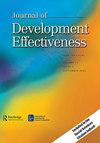Economic shocks and risky sexual behaviours in low- and middle-income countries: a systematic review of the literature
IF 0.5
4区 经济学
Q4 DEVELOPMENT STUDIES
引用次数: 4
Abstract
ABSTRACT We document the extent to which economic shocks through economic incentives explain HIV transmission through risky sexual behaviours in LMICs. We include 35 papers containing 31 unique negative and 11 unique positive economic shocks combined with over 320 health and risky sex outcomes. We find a diverse literature with varying empirical approaches showing increases in risky sexual behaviours are more sensitive to negative shocks than decreases are to positive shocks. Those already at risk of engaging in transactional sex are particularly vulnerable to increasing risky behaviours. Protecting against negative shocks is likely to most effective in preventing HIV transmission.低收入和中等收入国家的经济冲击和危险性行为:对文献的系统回顾
我们记录了通过经济激励的经济冲击在多大程度上解释了中低收入国家通过危险性行为传播艾滋病毒。我们收录了35篇论文,其中包含31种独特的负面经济冲击和11种独特的积极经济冲击,以及320多种健康和高风险的性行为结果。我们发现不同的文献与不同的经验方法表明,危险性行为的增加对负面冲击比减少对积极冲击更敏感。那些已经有从事交易性行为风险的人尤其容易增加危险行为。预防负面冲击可能是预防艾滋病毒传播最有效的方法。
本文章由计算机程序翻译,如有差异,请以英文原文为准。
求助全文
约1分钟内获得全文
求助全文

 求助内容:
求助内容: 应助结果提醒方式:
应助结果提醒方式:


